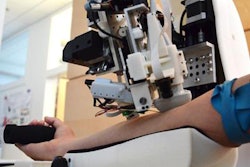Researchers from China have created a robot capable of facilitating brain surgery during MRI scanning, according to a report by the Standard.
The group, led by first author Guo Zi-yan, PhD, from the University of Hong Kong, found that using the robot boosted the accuracy and efficiency of surgical treatments involving implanted electrodes to restore brain activity. The robot is made up of two "arms" for needle insertion, as well as wireless trackers and a fluid-powered motor.
Brain surgeries addressing health concerns such as Parkinson's disease and brain cancer generally depend on preoperative MRI scanning for visualization and planning, the researchers noted. Opening a patient's brain during surgery, however, causes cerebral fluid to seep out, changing the brain's position. As a result, patients are asked to stay awake during such procedures to confirm that the surgeons are not making any errors in electrode placement.
With the new robot, clinicians can refer to real-time MRI for precise placement of electrodes, and patients will no longer need to stay awake during the operation, they said. The robot is currently undergoing preclinical testing.



















